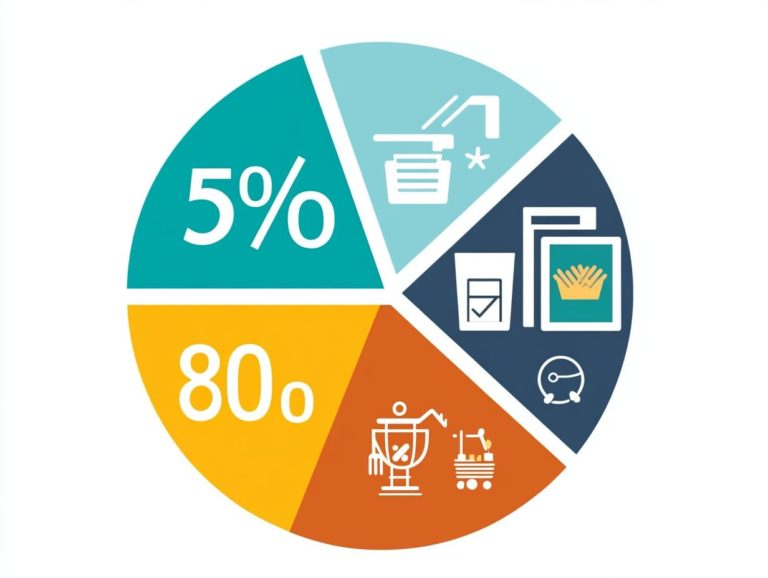5 Budgeting Techniques for Freelancers
Freelancing provides an alluring blend of flexibility and independence. However, it often comes with financial uncertainty.
To truly thrive in this dynamic landscape, learning how to budget is crucial. This article explores five practical budgeting techniques specifically for freelancers, guiding you through tracking expenses and establishing realistic budgets.
You’ll also discover common financial challenges that freelancers face and how effective budgeting can help you overcome them. Whether you’re experienced in the gig economy or just starting out, these strategies will empower you to take control of your financial future.
Contents
- Key Takeaways:
- 1. Track Your Expenses
- 2. Set a Realistic Budget
- 3. Prioritize Your Spending
- 4. Use Budgeting Tools and Apps
- 5. Plan for Irregular Income
- How Can Budgeting Help Freelancers?
- Frequently Asked Questions
- What are the top 5 budgeting techniques for freelancers?
- How can creating a budget help freelancers with their finances?
- What does tracking income and expenses involve for freelancers?
- Why is setting financial goals important for freelancers?
- Why should freelancers save for taxes separately?
- What are some budgeting tools that freelancers can utilize?
Key Takeaways:

- Keep track of your expenses to better understand your spending habits and identify areas where you can cut back.
- Set a realistic budget that considers both your regular and irregular income, along with your necessary expenses.
- Prioritize your spending by distinguishing between needs and wants and allocating your money accordingly.
1. Track Your Expenses
You must track your expenses for successful budgeting, especially as a freelancer dealing with varying income and cash flow. By keeping detailed financial records, you can identify spending patterns, save money effectively, and maintain a steady cash flow for both business and personal needs.
You can benefit greatly from different expense tracking methods. Using spreadsheets lets you customize your monitoring approach, while money-saving apps like Mint or Expensify simplify the process with automated tracking features and alerts for potential savings.
Keeping a close eye on your expenditures boosts your financial health and is invaluable during tax season, ensuring you accurately account for deductible expenses. Proactive expense management prepares you for potential cash flow gaps, giving you the foresight to handle any financial uncertainties.
2. Set a Realistic Budget
Creating a realistic budget is essential for freelancers aiming for financial stability. It enables effective financial planning while accommodating income variability from diverse income streams.
Understanding that your income can fluctuate significantly is critical. Careful planning for both fixed and variable expenses is essential. Setting aside a portion of your earnings for savings provides a safety net and fosters a sense of security amid unpredictable workloads.
To improve your budgeting efficiency, consider these strategies:
- Track your expenses through user-friendly apps.
- Set aside a percentage of each paycheck for savings.
- Utilize the 50/30/20 rule to prioritize needs, wants, and savings goals.
By adapting these approaches, you can create a balanced budget that supports your unique financial landscape.
3. Prioritize Your Spending
Prioritizing your spending is crucial for achieving financial security, especially for freelancers facing income ups and downs. Understanding the difference between needs and wants lets you allocate funds effectively to cover essential expenses like housing, utilities, and groceries key components for a stable lifestyle.
It s also vital to save for retirement, preparing for future needs while building a fund for unexpected costs. Creating a budget that includes discretionary spending lets you balance enjoyment with financial responsibility, alleviating stress from income variability and helping you reach your long-term financial goals.
4. Use Budgeting Tools and Apps

Utilizing budgeting tools and apps can significantly streamline your financial management process as a freelancer. They provide you with a visual aid that enhances both income tracking and expense monitoring for improved financial oversight.
Popular tools like Digit and Capital One 360 are user-friendly and cater to different financial needs. For example, Digit automatically analyzes your spending habits and sets aside small amounts to help you save effortlessly. On the other hand, Capital One 360 gives you a full picture of your expenses, making it easier to create budgets and manage cash flow.
By leveraging these tools, you ll see a clearer picture of your finances and develop better spending habits. When selecting the right app, think about the layout, specific features, and how well it aligns with your personal financial goals ensuring it s the perfect match for your unique circumstances.
5. Plan for Irregular Income
Planning for irregular income is essential for you as a freelancer, especially when cash flow tends to fluctuate. This foresight ensures your financial stability and prepares you for unexpected expenses that can pop up out of nowhere.
To navigate these unpredictable financial waters, establishing an emergency fund can be your vital buffer. This allows you to draw from your savings during lean months without added stress. It’s also crucial to set aside estimated taxes to avoid unpleasant surprises come tax season. Diversifying your income streams provides a safety net and helps mitigate the effects of cash flow gaps.
By incorporating various sources of income, you can create a more stable financial foundation, significantly reducing the impact of downturns in any one area of your work. This proactive approach allows you to thrive in the ever-changing landscape of freelancing.
How Can Budgeting Help Freelancers?
Budgeting is a fundamental pillar that supports your journey as a freelancer, enabling you to manage your cash flow effectively while navigating unique challenges such as income variability and unexpected expenses.
By establishing a clear budget, you can better allocate your earnings toward essential costs like tools, software, and marketing, while also reserving funds for personal needs and unforeseen situations. Effective expense tracking allows you to identify patterns in your spending habits, giving you the power to make informed decisions that enhance your financial health. To further develop your financial strategy, consider these 5 ways to improve your budgeting skills.
By prioritizing long-term savings, you can build a financial safety net that offers peace of mind during leaner months. This ensures greater stability in your entrepreneurial journey. This proactive approach not only fosters financial resilience but also empowers you to seize new opportunities with confidence.
What Are the Common Financial Challenges for Freelancers?
Freelancers often encounter distinct financial challenges that can complicate personal finance, such as income variability, cash flow gaps, and the necessity for diligent tax preparation and management of business expenses.
These obstacles are further complicated by the unpredictability of client payments, which can sometimes arrive late or not at all, leaving freelancers in a tight spot as they juggle personal bills alongside business commitments. This variability in earnings calls for a robust budgeting strategy, enabling you to anticipate lean periods and allocate funds wisely.
Implementing effective financial planning techniques can empower you to establish an emergency fund, providing a safety net during slower months and ensuring that both personal and business financial obligations are met without undue stress.
By utilizing tools like expense trackers and financial apps, you can gain clearer insights into your cash flows, allowing you to make informed decisions and navigate your unique financial landscape with greater ease.
How Can Freelancers Save Money?

Freelancers can effectively save money by embracing a range of savings techniques and budgeting strategies that help maximize income while minimizing unnecessary expenditures.
Leveraging online platforms and apps designed for financial management can significantly streamline your process. By carefully tracking expenses in real-time, you ll spot unnecessary spending and make adjustments as needed.
Establishing an emergency fund is also a wise move; it acts as a financial cushion during lean periods. It s crucial to prioritize savings in your budgeting strategy, allowing you to consistently allocate a specific percentage of your earnings.
This proactive approach strengthens your financial stability. It also encourages a mindset focused on long-term financial well-being.
What Are the Benefits of Creating a Budget as a Freelancer?
Creating a budget as a freelancer offers a wealth of advantages that enhance your financial planning, boost your savings, and ultimately lead to greater stability in the often unpredictable freelance income.
By carefully tracking your income and expenses, you gain better control over your finances, enabling you to spot unnecessary spending and make informed decisions.
Improved cash flow management becomes within your grasp, allowing you to foresee potential shortfalls and adjust your spending habits accordingly.
Establishing a budget gives you the power to prioritize your financial goals, whether that means saving for retirement, investing in education, or building an emergency fund. This strategic approach not only alleviates financial stress but also paves the way for increased opportunities, ensuring that every project or client you take on contributes meaningfully to your long-term aspirations.
What Are the Best Budgeting Techniques for Freelancers?
Freelancers can utilize a variety of effective budgeting techniques tailored specifically to their unique financial landscapes, allowing for improved income management and fostering a more balanced approach to personal budgeting.
One standout technique is the 50/30/20 rule, which means you allocate 50% of your income to essentials like rent, 30% to fun and leisure, and 20% to savings or debt repayment. Alternatively, zero-based budgeting encourages you to assign every dollar a specific purpose, ensuring that no expense goes unaccounted for. Then there’s the envelope system, which utilizes physical or digital envelopes to categorize expenses, helping you maintain discipline in your spending.
Together, these strategies give freelancers the power to track their income streams and expenses with greater accuracy, paving the way for informed financial decisions and lasting stability.
How Can Freelancers Stay Motivated to Stick to a Budget?
Staying motivated to adhere to a budget can indeed be a challenge for freelancers, but with the right financial tips and strategies, this journey can become both manageable and rewarding.
Set achievable financial goals now! This creates a clear roadmap to success that not only boosts your confidence but also instills a deep sense of purpose. Regularly tracking your progress allows you to see just how far you’ve come, making it much more likely that you’ll continue to prioritize your financial well-being.
Remember to celebrate those small victories whether it’s reaching a savings milestone or sticking to your budget for an entire month. These celebrations reinforce your positive behavior.
Over time, disciplined budgeting doesn t just lead to immediate financial stability; it lays the groundwork for long-term success. This approach gives you the power to thrive in both your career and personal life.
Frequently Asked Questions

What are the top 5 budgeting techniques for freelancers?
The top 5 budgeting techniques for freelancers are: creating a budget, tracking income and expenses, setting financial goals, saving for taxes, and utilizing budgeting tools.
How can creating a budget help freelancers with their finances?
A budget gives freelancers a clear picture of their income and expenses. This clarity helps them make smart financial choices and avoid overspending.
What does tracking income and expenses involve for freelancers?
Tracking income and expenses means recording all income sources and spending. This helps freelancers understand their cash flow and spot areas for improvement.
Why is setting financial goals important for freelancers?
Financial goals keep freelancers motivated and focused. They can save for retirement, pay off debt, or invest in their business.
Why should freelancers save for taxes separately?
Freelancers must pay their own taxes, so saving a portion of their income is essential. This helps avoid financial stress when tax season arrives.
What are some budgeting tools that freelancers can utilize?
Freelancers can benefit from budgeting apps, spreadsheets, and financial planning software. These tools make tracking expenses and setting financial goals much easier.






